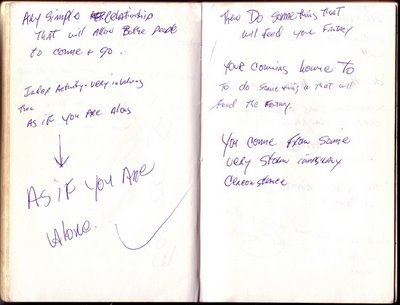To clarify:
Within a context of Sanford Meisner's instruction, this entry has to do with an element of the work within the full repetition exercise, whereby an improvisation is structured within imaginary circumstances whereby the acting partners choose an imaginary relationship consistent with the reality of sharing a common living area; "roommates,” for example. The entry "any simple relationship that will allow both people to come + go . . .," this entry refers to the introduction of the "[coming home] As if you are alone," element of Sanford Meisner’s work.
In a "roommates" scenario, each person arrives "home" not expecting the other person to be there; hence, "as if you are alone." One actor may arrive to an empty apartment, then the other who is unawares that the other is at home or not.
On the facing page, "Then do something that will feed your fantasy . . . You come from some very strong imaginary circumstance."
This aspect of the exercise is intended to practice the human happenstance of arriving home (entering from offstage), having come from an incident that has strong emotional resonance associatied to it. But, most importantly, DOING something in the present.
For example, a person has just returned home from meeting the person of their dreams, with the “dream lover’s” phone number, and instructions to "call me." The actor might arrive home to rehearse that phone call, making sure to prepare to say only those things that will advance the “dream relationship” only toward mutual admiration. While "rehearsing" for this big phone call. The other roommate {other actor) arrives from learning their bank account is overdrawn and needs to use the phone to raise a specific amount of money, "or else."
The goal is for the entire improvisation, everything that happens from beginning-to-end, to occur while “living truthfully under the imaginary circumstance.”
The nuance about this entry, that is easy to miss, is that we human beings arrive home and bring the emotional life from “what happened before” with us. Yet, we don’t force (play) the emotion; we are often not even aware of our feelings, yet they exist nonetheless. This emotion just lives inside of us effortlessly. (The actor, however, must know. Like a painter must know their colors.) We arrive with this emotional life living inside of us (left alone – the emotion), and place our attention on what we DO in the present moment.
Hope this helps.
 -- click on image to enlarge --
-- click on image to enlarge --

0 Comments:
Post a Comment
Links to this post:
Create a Link
<< Home